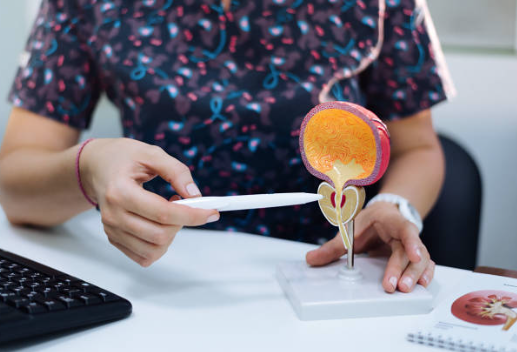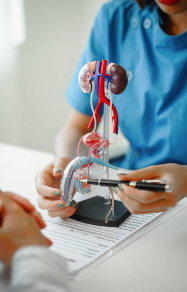Blood in urine – Male – No pain – Prostate cancer?

Blood in urine – Male – No pain – Prostate cancer? A Critical Guide for Men Over 40
Seeing blood in your urine is a startling experience, especially for men over 40. Your mind races with worry, and questions start swirling. Is it dangerous? Could it be cancer? Let’s break down this alarming symptom and what it might mean for your health.
What is the most common cause of blood in urine?
The most common reason for blood in urine male is an infection within the urinary tract. These infections often take the form of:
-
Urinary Tract Infections (UTIs):
UTIs are incredibly prevalent, particularly in men over 40. Bacteria can infect the bladder (cystitis) or the urethra (urethritis), leading to inflammation and sometimes bleeding. Symptoms might include pain or burning during urination, a frequent urge to urinate, and foul-smelling or cloudy urine.
-
Kidney Infections:
More severe infections can ascend into the kidneys (pyelonephritis). Alongside blood in the urine, kidney infections can cause back pain, fever, chills, nausea, or fatigue.
Important Note: While infections are the most likely culprits, it’s vital to rule out other potential causes, especially for men over 40. Some other possibilities include:
-
Prostate Issues: Beyond Just Enlargement
- Enlarged prostate (BPH):
This common condition in older men can cause bleeding due to pressure on the urethra.
-
-
Prostatitis:
-
Inflammation of the prostate gland can lead to blood in the urine, along with other symptoms like pain during urination or ejaculation.
-
Kidney Stones or Bladder Stones:
More Than Just Painful While intense pain is often associated with passing stones, they can sometimes cause painless bleeding too.
-
Certain Medications: Check Your Prescription List
-
Blood thinners:
-
Medications like aspirin or warfarin can increase the risk of bleeding throughout the body, including in your urinary tract.
-
-
Chemotherapy Drugs:
-
Some cancer treatment medications can cause temporary bladder irritation and bleeding.
-
Kidney Disease: A Hidden Risk Factor:
Various kidney issues can lead to blood leaking into your urine. This is why regular check-ups are important, especially if you have risk factors like diabetes or high blood pressure.
-
Cancer (though less common): Awareness Saves Lives:
While not the most frequent cause, bladder, kidney, or prostate cancer can sometimes trigger blood in your urine. Early detection is key, which is why prompt medical attention is crucial, especially for men over 40.
Understanding Blood in Urine: Pain vs. No Pain – What It Means for Your Health
Is it just an infection, or something more concerning? Pain accompanying blood in your urine provides valuable clues about the potential causes:
-
Blood in Urine Male with Pain: When to Worry Less (Usually):
If you’re experiencing painful urination, burning, or a strong urge to go frequently, a urinary tract infection (UTI) or inflammation is the likely suspect. UTIs are very treatable in men and should be addressed promptly by a doctor. Kidney stones, if passing, can also cause intense pain alongside blood in the urine.
-
Blood in Urine Male No Pain: When to Take it Seriously:
This is where it’s crucial to pay attention, especially if you’re male and over 50. While not always a sign of a severe health problem, painless bleeding can sometimes indicate:
-
-
Enlarged Prostate (BPH):
-
This common condition affecting older men can put pressure on the urethra, leading to bleeding. Talk to your doctor about possible prostate issues.
-
-
Bladder or Kidney Cancer:
-
While not the most likely cause, it’s important to be aware. Speak to your doctor immediately if you have no pain but are seeing blood in your urine, especially if you’re over 60.
Important Reminder: Regardless of whether it’s a small or large amount of blood, never dismiss it. Getting a professional diagnosis is important to determine the cause of bladder infection vs prostate bleeding, or any other issue.

Could it Be Something Serious? Blood Clots, Prostate Issues, and Cancer Risk
Passing blood clots in urine male is a major red flag and warrants immediate medical attention. While kidney stones or other conditions can sometimes cause clots, it’s vital to rule out more serious possibilities, including the risk of blood in urine male cancer.
-
The Prostate Connection:
Both prostate cancer and non-cancerous prostate enlargement (BPH) can trigger the formation of blood clots in the urine. As the prostate is located near the bladder and urethra, any bleeding within the prostate can mix with urine as it passes out of the body.
-
Don’t Panic, But Do Act Fast:
While cancer is a frightening word, remember that early detection can significantly improve treatment outcomes. If you see blood clots in your urine, it’s not about fear, but about taking prompt action for your health.
-
Why Urgent Medical Attention Matters:
It’s not just about identifying cancer. A doctor needs to determine the cause of the blood clots, whether it’s prostate-related, kidney stones, or other conditions. Prompt evaluation can prevent complications and lead to appropriate treatment.
Can Blood in Urine Go Away on Its Own? It Depends…
There are instances where minor bleeding might clear up without treatment. For example, strenuous exercise can sometimes cause temporary, harmless blood in the urine (this is called exercise-induced hematuria). However, relying on the hope that the bleeding will disappear is a risky gamble.
Why You Should Never Ignore Blood in Your Urine (Even if it Seems Minor)
Here’s the crucial point: what might appear to be a “minor” case of blood in your urine could mask a more serious underlying issue. Only a medical professional can determine the true cause through proper testing. Here’s why seeking a doctor’s evaluation is so important:
-
Hidden Infections:
Even if pain isn’t a major factor, an infection might be lurking and could worsen without treatment.
-
Kidney Problems:
Conditions affecting your kidneys often don’t show obvious symptoms early on, but blood in your urine can be a red flag.
-
The Risk Over 40:
As men age, the possibility of prostate problems or even bladder or kidney cancer increases. Even a small amount of blood in the urine needs medical attention.
Don’t Self-Diagnose: Get Answers, Get Peace of Mind
It’s natural to try and figure out what’s happening when you spot blood in your urine. However, resist the temptation to play doctor online, as tempting as “Dr. Google” can be. Here’s why a professional medical opinion is always best:
-
The Importance of Accuracy:
Even doctors may need tests to pinpoint the exact cause of bleeding. Self-diagnosis risks missing the true issue, potentially delaying the right treatment.
-
Peace of Mind vs. Needless Worry:
Seeking professional diagnosis isn’t meant to cause unnecessary fear. It’s about replacing uncertainty with knowledge. In most cases, you’ll discover the cause is easily treatable.
-
The Power of Early Detection:
If the cause is something more serious, like bladder or kidney cancer, early detection is your best ally. It often leads to the most effective treatment options and improves the chances of a positive outcome.
Decoding the Most Common Causes of Blood in Urine in Men: What You Need to Know
Let’s delve into the most frequent triggers of blood in the urine, especially for men:
-
Enlarged Prostate (BPH): A Growing Concern as You Age:
As men get older, the prostate gland, which sits below the bladder, can enlarge. This condition, known as benign prostatic hyperplasia (BPH), can squeeze the urethra, making it harder to urinate fully. This pressure often leads to spotting blood in your urine. Note: BPH is different from prostate cancer, although both become more likely with age.
-
Kidney or Bladder Stones: Tiny Troublemakers:
Imagine them as hard, crystalized mineral deposits that can develop anywhere in the urinary tract. The jagged edges of these stones can cause painful scratches, ulcers, and blood to appear in your urine. Besides pain, they can also block urine flow and put you at higher risk for infections.
-
Kidney Disease: When Your Filters Malfunction:
Several kidney diseases can lead to blood leaking into your urine. Chronic conditions like inflammation (glomerulonephritis) or inherited disorders like polycystic kidney disease can trigger this symptom. It’s essential to get your kidney function checked regularly, especially if you have risk factors for kidney disease like diabetes or high blood pressure.
-
Trauma: When Injury Strikes:
Falls, blunt force injury to the back or abdomen, or intense contact sports accidents can damage your kidneys or bladder. While the bleeding is often temporary, it’s important to see a doctor to rule out any serious internal damage.

Don’t Panic, Take Action: What to Do When You See Blood
Noticing blood in your urine is understandably frightening. But taking focused action is better for your health than panic. Here’s your game plan:
-
Stay Hydrated:
Increase your water intake significantly. This might help flush out irritants in your urinary tract and potentially decrease bleeding.
-
See a Doctor: Never hesitate!
A thorough doctor’s visit is essential. Seek medical attention quickly, especially if you’re male and over 40. Urine tests and a detailed check-up will help pinpoint the cause.
-
Expect Questions: Your doctor needs a complete picture.
Be prepared to discuss:
-
- Medical history: Past illnesses, surgeries, or existing conditions
- Medications: Prescription drugs, over-the-counter medications, and supplements
- Recent activities: Strenuous exercise, possible injuries, sexual activity
-
Possible Tests: Prepare for Further Investigation
Finding blood in your urine is the first step – next comes pinpointing the cause. Depending on your individual situation, medical history, and other symptoms, your doctor might recommend one or more of the following:
-
Prostate Exam: The Power of a Simple Checkup:
Especially for men over 50, a digital rectal exam (DRE) helps your doctor assess the size and health of your prostate. An enlarged prostate (BPH) could be the reason for your bleeding.
-
Imaging Scans: Seeing Inside for Answers
-
Ultrasound:
-
Using sound waves, this painless test creates images of your kidneys, bladder, and other urinary tract organs. It can detect blockages, stones, tumors, and other abnormalities.
-
-
CT Scans:
-
These detailed X-ray images offer a comprehensive look at your internal structures. CT scans provide additional clarity to your doctor to help rule out or determine specific causes.
-
Cystoscopy: A Closer Look Inside Your Bladder:
This specialized procedure uses a thin, flexible scope with a tiny camera to examine the inside of your bladder and urethra. It’s helpful for detecting bladder tumors, inflammation, or sources of bleeding.
When Blood in Urine is an Urgent Signal for Men
While most cases are treatable, these signs necessitate immediate medical attention:
- Large blood clots in urine male
- Blood in urine accompanied by severe pain
- Blood in urine plus fever and chills (this could signal a serious infection)
- Repeated episodes of blood in urine even if the bleeding is minimal
- If you have a known increased risk for prostate or bladder cancer
Beyond Physical Causes: Medications and Lifestyle Factors That Can Affect Your Urine
It’s not always a disease or infection – sometimes the cause of blood in your urine lies in your medication cabinet or exercise routine. Here’s a closer look:
-
Blood Thinners: A Risky Side Effect:
If you take blood thinners (anticoagulants) like warfarin, aspirin, or others, talk to your doctor immediately when you notice blood in your urine. These medications prevent clotting, making bleeding episodes more likely even within the urinary tract. Your doctor might need to adjust your medication.
-
Strenuous Exercise: Pushing Your Body to the Limit:
Sometimes referred to as “marathon runner’s hematuria”, very intense workouts can irritate the bladder and cause temporary, harmless bleeding. Think long-distance running, high-intensity sports, etc. While usually not a cause for concern, it’s good to mention to your doctor, especially if it’s a recurring issue.
Additional Factors to Consider
- Recent Procedures: Did you have a urinary catheter, or undergo any procedure in the urinary tract recently? These can sometimes cause transient bleeding.
- Diet: In rare instances, certain foods like beets in large quantities might temporarily color your urine reddish. Be mindful of anything unusual in your diet.
Blood in Urine Male Treatment: Tailored to the Root Cause
There’s no one-size-fits-all solution for blood in the urine. Your doctor will work to uncover the underlying reason for the bleeding. Here’s a breakdown of possible treatment approaches based on some of the most common culprits:
-
Infections: The First Line of Defense
If a bacterial infection (like a UTI) is causing the bleeding, prescribed antibiotics will usually be the solution. Your doctor will choose an antibiotic that targets the specific bacteria responsible for the infection.
-
Kidney Stones: When Hydration is Not Enough
- Small stones: Drinking copious amounts of fluids can help flush out smaller kidney stones, easing pain and reducing bleeding.
- Larger stones: Your doctor might recommend pain medications or procedures to break up or remove large stones that won’t pass naturally. Options include:
- Shockwave lithotripsy: Using sound waves to break up stones.
- Ureteroscopy: Passing a scope to directly access and remove the stones.
-
Enlarged Prostate: Managing a Common Age-Related Culprit:
For men with enlarged prostate (BPH), treatment options include:
-
- Medications:
Alpha-blockers or 5-alpha reductase inhibitors can relax prostate tissues or shrink the prostate, reducing pressure on the urethra and improving urine flow.
-
- Minimally invasive therapies:
Several less invasive procedures can ease symptoms caused by BPH.
-
- Surgery:
For severe cases, surgery may be necessary to remove prostate tissue.
-
-
Prostate Supplements:
-
A Potential Aid for Enlarged Prostate (BPH)
Enlarged prostate, also known as benign prostatic hyperplasia (BPH), is an incredibly common condition in aging men. It can cause frustrating symptoms like frequent urination, difficulty emptying your bladder, and blood in the urine. While prescription medications are a primary treatment option, many men are curious about natural supplements.
-
-
Key Prostate-Focused Supplements
Here’s a look at some widely available supplements that show promise in supporting prostate health:
- Saw Palmetto: This plant extract is the most popular and well-researched option. Studies suggest it might reduce BPH symptoms and improve urinary flow.
-
-
-
- Beta-sitosterol: Found in many plants, this compound may help shrink the prostate and ease urination difficulties.
-
-
-
- Pygeum: Derived from the African plum tree bark, it could combat inflammation and urinary issues related to BPH.
-
-
-
- Rye Grass Pollen Extract: Some research indicates it may improve nighttime urination frequency and urine flow.
-
-
Cancer: A Multi-Faceted Treatment Approach
If cancer is found to be the cause of blood in your urine, your doctor will discuss a personalized treatment plan based on the type and stage of cancer. This might involve:
Surgery: Removal of part or all of the bladder, prostate, or affected kidney.
Radiation Therapy: Targeting cancer cells with high-energy beams.
Chemotherapy: Using medication to destroy cancer cells throughout the body.
Other therapies: Immunotherapy and targeted drug therapies may be options, depending on the specific cancer.
Peace of Mind: Knowledge is Power
Finding blood in your urine is undoubtedly scary. Yet, understanding the potential causes and knowing when to act empowers you to protect your health. If you’re a man over 40, make prompt medical check-ups a priority. Remember, early diagnosis and treatment usually result in the best possible outcomes.

FAQs: Your Blood in Urine Questions Answered
FAQ-1: Is blood in urine male always serious?
ANSWER: While any blood in your urine warrants a doctor’s visit, it’s not always a sign of a major medical problem. Common causes like urinary tract infections (UTIs) are usually easily treatable. However, it’s especially important to see your doctor promptly if you’re male and over 40.
FAQ-2: Could blood in urine male with pain be a UTI?
ANSWER: Yes, most likely. Painful, burning urination along with blood often indicates an infection in the urinary tract. See your doctor to get the right antibiotics to clear the infection.
FAQ-3: I have blood in urine male no pain – what could it be?
ANSWER: Painless bleeding can be a sign of an enlarged prostate (common in older men), kidney stones, or in some cases, bladder or kidney cancer. Never ignore blood in your urine, even when painless – see your doctor right away.
FAQ-4: Will blood in urine male go away on its own?
ANSWER: Sometimes, mild cases might. However, never self-diagnose. It could be something minor or something more serious. Only a medical professional can determine the cause and the necessary treatment.
FAQ-5: What kind of treatment is needed for blood in urine male?
ANSWER: Treatment depends entirely on the underlying reason for the bleeding. Your doctor might prescribe antibiotics for an infection, recommend procedures for kidney stones, or discuss medication and other options for an enlarged prostate. If the cause is cancer, there are various treatment options depending on the type and stage.
SEE ALSO: Latest Prostate Supplements >>
NOTE :
The information provided in this article and the rest of this website is intended for general knowledge and informational purposes only, and does not constitute medical advice. It is essential to consult a qualified healthcare professional for the diagnosis and treatment of any health condition. Never disregard professional medical advice or delay in seeking it because of something you have read in this article.

